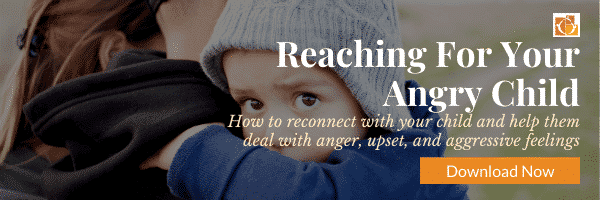As parents, we want nothing more than to help our kids feel loved and nurtured. When they are upset, every cell in our bodies leans towards making them feel better. We ache to have the upset stop and to do this, we use a calm voice, a warm hug.
Yet often, in the throws of their upset, kids throw these caring gestures right back at us. When our child screams at us to go away, we’re left feeling hurt and rejected. When they stomp off and slam a door in our faces, we’re confused. Should we stay close or do as they ask and go?
After school recently, I could tell my son was a little “off.” He wouldn’t make eye contact and kept asking for treats, even though I had brought a special treat snack for the car ride home. Not long after we got home we did some special time together and when it ended he asked for more.
I offered 5 more minutes and he balked at the pittance. “That is NOT enough time. When is Papa coming home?!”
When I told him “Pretty soon, I think,” he started crying while yelling “I want someone to play with NOW!”
I said warmly, “I can see you really want someone to play with, sweetie.”
He began crying loudly, talking and whining all at once, so I couldn’t understand what he was saying. He began throwing his body around and kicking his legs on the ground. I could see how much he needed me so I got a little closer.
What came next was a response that has overwhelmed and confused me at times. “Get away from me! Stop looking at me! You’re making it worse! I can NEVER be alone!”
In the face of those words, I would often freeze, caught between wanting to help and wanting to respect his autonomy and request for space.
I used to hear words like these and have a little panic, “Do I stay close or give him space? If I stay close, am I smothering him?”
If I Stay Too Close Am I Smothering My Child?
But I’ve learned, through trial and error, that finding a way to stay near almost always results in a better connection between us. His good clear thinking returns and the atmosphere in our family lifts.
When he was younger, it was more often clear that I needed to come close and to set a physical limit to prevent him from hurting himself. Now that he’s older this is still sometimes true. But lately I can more often be nearby without immediately making physical contact, the way I needed to when he was a toddler.
I try to only get as close as I need to to keep him safe. This allows me to honor my instinct to be near while also honoring his request to have some space.
I told him, “I know you want me to leave, sweetie, but when I have left you before it didn’t help.” He ran away into his room and told me, “Stay away!”
I took one step into his room, sat down and leaned up against the closed door, on the opposite side of the room from him. I told him, gently, “I’m just going to sit over here and listen.”
He thrashed all over his bed sobbing, kicking, thrashing and yelling, “GET OUT! You’re being mean to me!!”
Wouldn’t it be so helpful if, when we poured our love into our children, they would immediately receive our kindness and melt into our arms in gratitude for our warmth and care?
That instant validation and confirmation, showing that our efforts were just what was needed, would be so helpful to us as parents.
Here’s the thing though – if we provide warmth and attention when our kids are having a hard time, things often look worse before they get better.
It may feel counter-intuitive, but really the safety of your warmth, presence and calm provides an anchor for your child. When you stay with them in this way, they feel safe and able to experience the pain and discomfort of whatever is troubling them.
How does that look?
They get louder, more bereft, more angry. In this instance, I remember thinking as that happened how glad I was able to be with him and how hard he was working as I listened.
That thought became my anchor, keeping me calm and open, so that he could anchor to me.
Eventually, slowly, his crying subsided.
He made eye contact (a sign I took as evidence his clear thinking was beginning to return) and told me again not to look at him with “that face.”
I decided to test the waters and see if he was ready to connect. Sometimes if I offer some light, gentle humor when I see signs of his return we are able to connect.
I slowly made my way to the bed where he sat and said, “You mean this face?!” and I slowly rolled my eyeballs and stuck my tongue out to the side.
“NO!” he yelled and began sobbing again.
I could see he wasn’t looking for a way out so I listened some more, quietly.
He ran out of his room yelling, “Don’t follow me EVER!!”
I followed him slowly and told him, “I’ll give you some space but I want you to know I’m near,” and I sat down on the couch whose back faced the play area he was in. I wasn’t looking right at him, but was close enough I could have reached for him if I needed to. He shut the gate to the play area and began stomping and kicking and throwing his body around. He tripped a bit and his head landed in some cushions with his rear end facing up. He stopped crying and let out a little giggle. I thought maybe this was my cue so I tried, “Hey! There’s an ostrich in your playroom!”
He thought that was funny and asked why I'd said an ostrich, so I explained how the birds bury their heads sometimes and their butts stick up.
He did this some more, over and over again, sticking his butt in the air, waggling it, and giggling.
I walked around into the play area while he did this and both of us were giggling.
He looked at me and started crying again because he had a headache from all the crying and yelling. I asked him if he’d like to sit in my lap. He did and cried for a while longer while I held him.
After a couple minutes, he rubbed his eyes, took a deep breath and said, “Sorry mama, you didn’t do anything wrong, I did.”
I said, “Sweetie, you didn’t do anything wrong. You did everything right. You had some big feelings and I am so glad I was able to be near you. I’m so glad I got to listen. That’s just what a person needs sometimes!”
He smiled up at me and started playing with his Legos. The rest of the evening he played happily and we had a really nice family dinner.
“Go Away” is a Code Word You Need To Know About
“Go away!” is usually code for “I feel so badly inside and your presence makes it impossible for me to not feel this way.”
Stuffed feelings are like the little moles in that whack-a-mole arcade game. They burrow out of site for a bit, only to pop up later in some other seemingly unrelated spot. If we have the capacity to listen, kids feel supported and, as the upset clears, lighter and more connected afterward. The good feelings that bubble up through that close connection with us helps them to solve issues that had plagued them minutes before.
The next time you hear your child scream “Go away!” try substituting it with, “HELP! I’m a chaotic mess inside and I don’t know what I’m doing!”
Listening Like This Works Best When It’s Two-Way
This understanding is far from what most of us grew up with and, because of that, it can be hard to stay calm, to listen openly, and not to doubt yourself. There are some things you can do to make this easier for yourself and reduce the stress in your parenting.
When the storm has passed and you have some time alone, try to remember a time from your own childhood when you felt awful and afraid and were unable to tell an adult what was happening or what you needed. What would you have preferred to happen? How different would you have felt if someone had been kind and open to you back then?
Listening partnerships are also a great place to explore how adults around you responded when you crossed their lines or threw a tantrum. You might also talk about how it feels to hear your own child tell you to “go away!”
One other line of thinking is to remember the earliest time someone told you to go away or made you feel unwanted.
Each of these inquiries helps you to empathise with the overwhelm your child is in if they scream “go away” and to explore what feelings you have about their behavior and harsh words.
Ideas For What To Do The Next Time Your Child Screams “Go Away!”
Take a breath, do a mental scan and ask yourself these questions:
“Am I able to really listen right now without needing my child to be different, without needing this to be over?”
“Do I feel welcoming of my child’s big feelings?”
If not, and if you can tell they are safe, you can tell your child something like, “Sweetie, I can see this feels really hard and I want to stay and listen but I need to have a drink of water.”
Don’t try to stay and listen if you really don’t have the capacity. You will have other opportunities to listen in the future and your ability to tell them, warmly, that you are unable to stay and listen is helpful in itself.
Remind yourself, in whatever way works for you, that the words and behavior is not personal. Them telling you to go away is not a true reflection of their feelings toward you but rather, their feelings toward what they are feeling.
Try saying one of these three sentences in your mind if they resonate:
“He is feeling so badly right now, this is confusing and overwhelming for him,”
“The only thing I have to do right now is listen to how she’s feeling. I don’t have to understand why this is happening,”
“I know if I listen they will feel my warmth and it will eventually help them.”
Remember that there is no “right” or “wrong” way.
Because each situation is unique, it’s better to see each new upset and your response as an improvisational dance. What worked for my son on the day I described above, won’t work the exact same way the next time he tells me to “Go away!”
What does remain the same is your unflappable warmth. Your ability to listen to where they (and you!) are at is what should remain constant.
Don’t rationalize, or hurry or distract, instead, follow their lead.
You might try humor as you see signs of their feelings beginning to clear, and it might not work. Not to worry. Stop and listen again. What are they showing you? In my case, my son was letting me know that even though he could look at me in the eyes, he wasn’t quite finished with his upset. I stayed gentle and calm and didn’t try to force anything.
He came back with humor on his own. I followed his lead and met him with my own humor. But we weren’t quite done with upset. The relief of the connection we’d made brought even more tears, so I stopped with the humor and listened more with warmth.
Not long after, the clouds parted and he was actually able to tell me I didn’t do anything wrong by him. We won’t always get this reassurance from our children, but we can provide it to ourselves, nonetheless.
You don’t have to understand why your children tell you to leave them alone.
You can still help them. That’s a profound departure in parenting for many of us who feel inclined to rationalize with our children when they are upset. We can take all of our effort and thinking and turn it, instead, toward the question of “How can I let my child know that they are safe and I am here and listening?”
As we offer our own gentle warmth toward them, we can offer the same to ourselves. We don’t have to understand or solve what happened or what went wrong for our children. Our listening presence is the most helpful thing we can offer in these moments and knowing that can be a big solace to ourselves when we feel confused.
Shauna Casey is a Certified Hand in Hand instructor in Santa Cruz, California.
Learn More
Read more in the post I Try to Listen, but my Child Screams Go Away!


